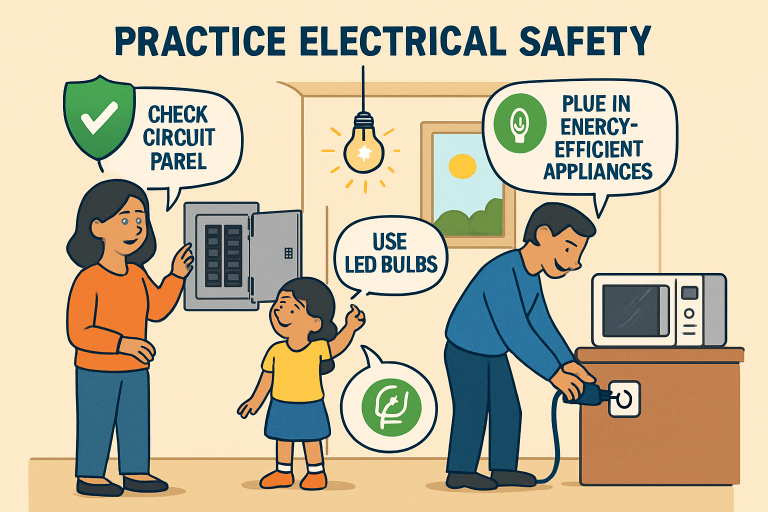Table of Contents
- Introduction
- Regular Inspections and Maintenance
- Upgrading to Modern Technologies
- Educating Household Members
- Implementing Energy-Efficient Practices
- Utilizing Smart Home Devices
- Ensuring Proper Wiring and Outlet Safety
- Preparing for Emergencies
- Consulting Professional Electricians
Introduction
Maintaining a safe and efficient electrical system is an essential responsibility for every homeowner. As our reliance on electrical appliances and devices increases, so does the importance of keeping your home’s system updated and secure. Advances in technology, the gradual increase in household energy demands, and ever-evolving safety regulations all underscore the necessity of proactive and knowledgeable maintenance. For comprehensive support, particularly in the Charlotte area, Touchstone Electric Charlotte area offers specialized expertise for residential electrical systems, ensuring your home’s wiring, outlets, and appliances are compliant with the latest codes and optimized for your family’s safety and everyday convenience. Taking these steps now can prevent a host of future problems and give you lasting peace of mind about the reliability and safety of your home’s electrical infrastructure.
It’s easy to overlook your electrical system as long as everything seems to be running smoothly, but it pays to be proactive. Implementing smart practices and regular checks, while leveraging modern technologies, will not only prevent hazards such as electrical fires or shocks but also help you optimize energy use. This means greater safety for your loved ones, increased efficiency, and potentially significant savings on your utility bills. These practical improvements can lead to a more comfortable and environmentally conscious home, further adding to your home’s value and your overall satisfaction as a homeowner.
Regular Inspections and Maintenance
Your home’s electrical system is a complex network that powers everything from lights to appliances and crucial devices. To keep it running smoothly and safely, it’s vital to arrange regular inspections by a licensed electrician. During these yearly or biannual checks, the electrician will look for issues such as worn insulation on wires, corrosion on outlets or circuit panels, loose connections, and signs of overheating or moisture. Neglecting small warning signs—like flickering lights, outlets that buzz or feel unusually warm, or persistent circuit breaker trips—can lead to dangerous situations, such as electrical fires or power surges. Routine maintenance is a highly effective way to spot and address these concerns early, extending the lifespan of your equipment and preventing catastrophic damage or expensive repairs. Addressing even minor symptoms early can save money and protect everyone in your home by keeping potential hazards at bay.
Upgrading to Modern Technologies
Today’s rapidly advancing electrical technologies provide unprecedented levels of safety, efficiency, and control for homeowners. Retrofit your electrical panel with smart circuit breakers that offer real-time notifications and can shut off circuits remotely. Not only do these tools add convenience, but they also boost safety by allowing instantaneous action if a hazard is detected. Installing whole-home surge protectors can prevent costly damage to sensitive electronics and appliances, shielding them from power grid fluctuations or lightning strikes. Also, replacing older ungrounded outlets with grounded ones, and updating high-risk zones such as kitchens, bathrooms, and outdoor areas with GFCIs or AFCIs, can substantially reduce the risk of electrical fires and accidental electrocution. Making these upgrades may also lower your home insurance premiums and ensure compliance with modern safety codes.
Educating Household Members
Knowledge is one of the most powerful tools you have when it comes to electrical safety. Each family member should safely understand the basics of using electrical outlets and devices. Teach children never to insert objects or fingers into outlets and to avoid playing with electrical cords. Adults should know to dry their hands before handling appliances and avoid overloading outlets with multiple high-wattage devices. Make it a habit to check cords and plugs for wear and tear, and to unplug devices when they’re not in use.
Most importantly, a home safety plan that includes instructions on cutting off power at the main panel during an emergency should be created. Set aside time for everyone—children included—to practice these emergency procedures. The Electrical Safety Foundation International offers easy-to-understand resources and interactive guides for teaching families practical electrical safety.
Implementing Energy-Efficient Practices
Improving your home’s energy efficiency not only saves money but also enhances overall electrical safety and reduces environmental impact. Switch older incandescent or halogen bulbs to modern LED lighting, which typically uses up to 80% less energy and stays much cooler. Upgrade outdated appliances such as refrigerators, washing machines, and dishwashers to models with ENERGY STAR certification, which are independently verified to meet the highest efficiency standards. Programmable thermostats and plug-in timers can optimize energy usage by automatically powering down devices when unnecessary. These efforts reduce strain on your home’s electrical circuits and can help prevent overheating and electrical faults. In addition, simple changes like unplugging chargers when not in use and ensuring appliances are correctly maintained will further increase your home’s efficiency and longevity.

Utilizing Smart Home Devices
The rise of smart home technology has opened up new avenues for controlling and monitoring energy use. Devices like smart plugs, home energy monitors, and integrated automation systems enable you to track exactly how much power each appliance or room uses in real time. Setting schedules for energy-intensive devices to run during off-peak hours can save money and reduce demands on your electrical system and the community’s utility grid. Some smart systems even learn your habits and recommend custom routines to improve efficiency further. Additionally, being able to control lights, climate systems, and even small appliances remotely can prevent accidental power drain or hazards when you’re away from home. You can learn more about these technologies at the U.S. Department of Energy, highlighting how innovative management can make your home safer and more efficient.
Ensuring Proper Wiring and Outlet Safety
Many electrical fires are caused by outdated wiring or insufficient outlets that can’t accommodate today’s electrical loads. If you live in an older home, it may be time for a wiring upgrade. Signs of trouble include outlets that are warm or sparking, circuit breakers that trip frequently, or lights that dim when large appliances cycle on. Tamper-resistant outlets offer protection, especially critical in homes with young children, by preventing accidental insertion of foreign objects. Have a professional replace any frayed or damaged wiring promptly, as these are direct fire risks and violate building codes. Keeping your wiring and outlets up to date ensures your home remains safe and functional for years to come.
Preparing for Emergencies
Even with the best maintenance, emergencies can happen—being prepared is key. Make sure you have fire extinguishers on every level of your home, and ensure they are rated for electrical fires (Class C). Install and regularly test smoke alarms and carbon monoxide detectors, placing them near bedrooms and key living areas for maximum protection. Familiarize yourself with the location of your electrical panel or breakers, and make sure these are clearly labeled for quick action during an emergency. It’s wise for every household member to know how to disconnect power quickly and safely. Consulting resources from organizations like the American Red Cross can help strengthen your emergency preparedness and response strategies, ensuring your loved ones are ready to respond safely should a crisis occur.
Consulting Professional Electricians
While some electrical tasks may seem manageable as DIY projects, it’s crucial to recognize when a professional’s help is needed. Licensed electricians are trained not only to install and repair safely, but also to diagnose underlying issues that aren’t always obvious to the untrained eye. They ensure that any work performed in your home adheres to local codes and industry standards. Scheduling periodic professional inspections and quickly addressing recommended repairs reduces risk and long-term costs. Investing in expert care can prevent costly mistakes, improve system reliability, and protect the health and safety of your family and property.
By embracing innovative solutions, keeping up with routine inspections, educating your household, and relying on trusted professionals, you’ll set your home up for long-term safety and efficiency. Proactive efforts today can prevent emergencies, save energy, and enhance comfort—making your house a secure investment for years to come

